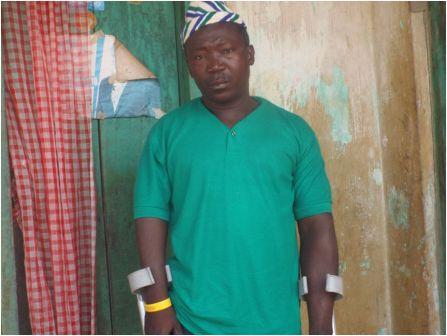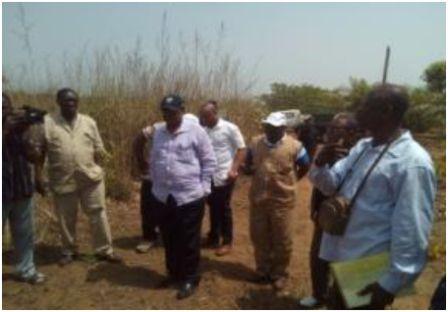Down With Addax’s $200M Investment … It’s not good for Sierra Leone!
A lot has been said to Sierra Leoneans about the Addax Bioenergy sugarcane/cassava for ethanol project, which Oluniyi Robbin-Coker, the Special Private Sector Advisor to His Excellency the President of the Republic of Sierra Leone, Dr. Ernest Bai Koroma, refers to as Sierra Leone’s flagship agricultural investmentâ€.
But all that has been said by the proponents of the Addax project so far, almost nothing has been heard about the high price that Sierra Leone, a country languishing at the very bottom of the global human development index (3rd from the last) and one that is yet to score up to 40 per cent in its drive to attain food self sufficiency, will have to pay by welcoming such a huge so-called agricultural investment.
With very open hands, the cash-constrained Government of Sierra Leone (GOLS) on 9th February 2010, signed a Memorandum of Understanding (MOU) with Addax Bioenergy Sierra Leone Limited, a Swiss-based company that is a subsidiary of the Addax & Oryx Group headed by Swiss financier and oil magnate, Jean-Claude Gandur ranked on the Forbes list of billionaires as the world’s 701st wealthiest man.
The MOU gives Addax the go-ahead to pursue its ambitious plan of establishing 10,000 hectares of sugarcane and cassava plantations for the production of ethanol for export to Europe…with the projected ‘employment’ of up to 4,000 able bodied Sierra Leoneans.
Addax’s Project Manager, Andrew Turay, affirmed that the production was destined for export to the European Union when he presented the project to the European Parliament Roundtable on Sustainable Biofuel Production. And in his presentation incredibly given that Mr. Turay is himself a son of Sierra Leone he also argued that Europe should drop the criteria for sustainable production of ethanol on Sierra Leone; so anxious was he to hand over our country’s precious land and water to foreign investors to pollute and abuse as they please for their own profits.
The million-dollar question is: if ethanol is for export to the European market, why do we need to have the plantation here?
In a desperate attempt to evade this question, the brains behind Addax have started issuing contradictory statements intended to mollify those concerned about the social and environmental upheaval the project will have, and are now trying to convince Sierra Leoneans that the ethanol and sugar to be produced will be for local consumption as well. There is this talk that ethanol is going to be used to reduce Sierra Leone’s dependency on imported petroleum products, by making the product suitable for consumption in cars and generators…even if the company’s  own Environmental, Health and Social Impact Assessment (EHSIA) states clearly that the sugarcane is for producing ethanol and that the said ethanol is for export. According to Addax Bioenergy’s Managing Director, Swiss national Nikolai Germann, “there is no market for ethanol in Sierra Leone, adding that only less than 10 per cent of it is going to stay for local use in our plants particularly.
There is this other talk that about 15 to 30megawatts of excess electricity to be produced by Addax and fed into the national grid (to supplement the Bumbuna Hydro) to be paid for, of course, by Sierra Leone.
Honourable Martin Bangura, referring to himself as the “champion†of the Addax Bioenergy project (because he happens to be the member of parliament representing the gullible population the Addax project is directly going to affect), said with utmost pride and satisfaction that the biggest benefit will be the 4000 jobs that the company is going to offer to our poor people who have never had the opportunity of being employed and paid monthly wages – which they can in turn use to better their lives as well as their dependants. And yet, Mr. Bangura, who claimed he has read the ESHIA, was unaware that that crucial document clearly states that only 2,200 of those jobs will be permanent; the rest will be casual and without end of service benefits.
So these are the big claims that the government and Addax are making to sell this project to the Sierra Leonean public. But what about the things they are not saying, the huge risks of such a project that involves leasing vast areas of farmland and using as labourers (for pittance) youths who otherwise could be more productive in their smallholder farms. It’s like bringing slavery back to the people, taking advantage of their acute poverty and gullible situation. Taking land out of food production for Sierra Leoneans and putting it into ethanol production for European vehicles, no doubt undermines food security in this country.
Strangely enough, Addax was given the green light some two years ago to use hectares and hectares of land at Lungi Acre, Makarie Gbanti Chiefdom, in the north of Sierra Leone, to pre-nurse its sugarcane and cassava plantations… even without a signed lease agreement. In fact it was the President himself, Dr. Ernest Bai Koroma, who nursed the very first sugarcane plantation…thereby giving the project an absolute legitimacy.
Giving that over 90 per cent or all of the ethanol product from Addax is going to be for export to Europe, one begins to suspect that the only reason that these industrial plantations are being brought here is courtesy of a number of factors ranging from, and not limited to easy and cheap access to land and of course cheap labour. $12 per hectare or $5 per acre is what Addax is going to pay per annum in lease, and is currently paying the 51 casual workers working in its nursery site at Lungi Acre the meagre sum of Le 10,000 (less than $3) per day. Among the 51 casual workers referred to is the headman of Yankassa village, who now has to spend the whole day driving a government owned tractor that is said to have been put on hire to Addax by officials of the Ministry of Agriculture Forestry and Food Security, instead of performing his duties as chief. Other factors that would obviously play in favour of Addax include the conducive climate condition suitable for ethanol production and the country’s special trade agreements with the European Union (EU)…which qualifies it to benefit from duty-free access to the EU market.
The long and short of it is that Addax Bioenergy Sierra Leone Limited is part of an exploitative chain of capitalist-oriented establishments seeking to take over or grab huge chunks of lands in Africa for the production of agrofuel and food stuffs for export to the European market…in the name of direct foreign investment in agriculture.
Olivier De Schutter, the United Nations Special Rapporteur on the Right to Food, refers to any kind of investment that threatens food security as catastrophic. Yet our pro-business President, Dr. Ernest Bai Koroma, launching the Addax project recently, expressed utter delight that through his government’s business-friendly approach, the country is now attracting big companies with big projectsâ€, adding that This project is further demonstration of our growing ability to attract huge economic investments, enhanced by the prevailing conditions of good governance in our country.
My government is looking forward to more investment ventures of this type, which could enhance our capacity to achieve our Millennium Development Goals. President Koroma emphatically stated this amidst the loudest of applauses – mostly from big people including ministers and parliamentarians who clearly ought to know better.
Whatever President Koroma means by thinking that the country’s attainment of the MDGs is in for a boost with companies like Addax around remain unclear, but as Olivier De Schutter, puts it African presidents and governments are signing deals without bringing them before parliament, competing with each other rather than working together to establish regional criteria that would require investors to commit to developing local infrastructure and leave at least half of any food produced in that country. He went on to state that investors are taking advantage of the problem of weak governance in countries where governments are not accountable to their own people. As an addendum, one would state that African presidents and governments that are being outweighed by budget deficits and outright incompetence, most often rush into signing deals with corporate entities without critically analyzing the negative effects of such deals on their vulnerable people and generations yet unborn.
A former head of the UN World Food Programme (WFP) is convinced that the use of valuable farmland to grow crops to produce agrodiesel is one of the main causes of the escalating costs of food in the world.
Sierra Leone is at the cross roads, desperate to welcome all manner of investors indiscriminately and no matter what costs to our nation. This is so because most often those entering into investment agreements on behalf of the country are either not genuinely pursuing the best interest of the ordinary masses, or are negotiating on a weak footing and sometimes even without understanding the underlying issues. They always believe the lies told to them by these so called investors…and then handover the key of liberty to them…almost for nothing in real terms. What a shame???
Addax’s occupancy of 10,000 hectares of Sierra Leonean land (Oluniyi Robbin-Coker, the Special Private Sector Advisor to His Excellency President Ernest Koroma, said the project will eventually cover 40,000 hectares) for a period of 50 years with possible extension to 70 years and more (Andrew Turay was frank when he remarked that the company will be operating here for up to 100 years) for ethanol production for export as per agreement, will not only deprive scores of families of their valuable farm lands as well as displacing an untold number of others from their natural homes, but also as stated earlier, impact negatively on the country’s food self sufficiency drive which is still a very long way off.
Just imagine that while the Addax agreement seems to have taken the centre stage, three other mega-leases are being negotiated for tens of thousands of hectares of land for oil palm plantations intended for biofuel production for export.
What such a country requires right now is not an exploitative form of investment, such as the one Addax has already embarked upon, but an investment that will contribute towards healing the wounds of the war i.e. improving the living standards of the people…rather than making life become much difficult for them. The Sierra Rutile example, where the people are saying that their lives have been made worse as a result of years of exploitative rutile mining in their locality, is a case in point. Another case in point could be the Chinese-owned Magbass Sugar Complex (with vast sugarcane plantation) that has operated in the Tonkolili axis, north of Sierra Leone for over 40 years but without any direct benefit to the people in terms of infrastructural and community development.
A salient question is what becomes of the land after Addax would have folded up its operations (maybe after 100 years when all of us shall have passed off and the emerging generation (s) left to suffer the brunt at the hands of their ever-fortunate European peers who would have inherited the plantations and vast Sierra Leonean lands from their long list of parents)?
The answer that comes up almost immediately is that the land is going to be useless forever. According to Addax’s ESHIA, its operations will include the use of giant boom sprayers for the application of herbicides and pesticides and a whole range of dangerous chemicals, about which local people have been told absolutely nothing, despite promises that they will be able to farm rice around the sugarcane in the boli lands poison rice?
In addition, the plantations will require massive irrigation from water to be sourced around the Rokel River-it might even include the diversion of that crucial river just to satisfy the water need of an outright exploiter. Of course the water level is bound to drop significantly as a result of the operations of Addax…which claims that it will be paying a cost for the use of the water.
Till date, Addax has not made clear the mitigation measures that will be put in place to checkmate or reduce the severe risks its operations pose on the wellbeing of the people and the vast arable land it intends to ‘illegally’ occupy for the next one hundred years or more.
What has worsened the whole thing is the seeming politicization of the 4000 jobs Addax is reportedly going to offer. Lending credence to this is the fact that a whole member of parliament, Honourable Martin Bangura of the ruling All People’s Congress (APC), is going all over the place referring to himself as the champion of the Addax project. He himself confirmed that he sometimes spent between two and three days in the villages to be affected, for the sole purpose of building confidence for the project among the people. The message he is reported to be passing on to his people is that The APC has brought you 4000 jobs. He is even likely to use that as a campaign chit in the next parliamentary elections in 2012.
It goes without saying that if Sierra Leone (in its quest to attain food security) could afford to effectively engage 4000 youth in state, city, town or village farms producing foods for home consumption and for export revenues, they will be much more productive and useful to the country than taking pride in sending them to work as slaves in plantations that are otherwise actually supposed to be somewhere in the outskirts of Europe. Instead, our government has handed over an enormous piece of our nation to foreign investors, and as if that were not enough, offered them a ten-year corporate tax holiday that will cost our country millions of dollars. So where is the benefit, the revenue for our economically deprived nation?
It is time that we offered support and respect to our smallholder farmers, the people who toil in swamps and biodiverse tree-crop plantations and market gardens and fields to produce the food we need, increasing their access to market, protecting their food and seed sovereignty, offering them decent feeder roads so that this nation can achieve its own food security and develop its agricultural sector from the farm up.
Not offer up our land and our labour to foreign investors, to allow ourselves to be re-colonized. Down with such a reckless investment…whether it involves $200M, $400M or billion or trillion dollars.
By Theophilus S. Gbenda, Freetown
Stay with Sierra Express Media, for your trusted place in news!
© 2010, https:. All rights reserved.







Brock Wolfe
/
If only I had a quarter for every time I came to http://www.sierraexpressmedia.com! Superb read!
30th May 2010Jon
/
Salone has nothing to gain.Do we know that growing casava and other Starch containing plants will eat away all the nutrition from our soil, and will consume all the agro water???
5th March 2010Momoh-Fonigay Lavahun
/
The problem is that many Sierra Leoneans will not have access or the time to read such an article. They also will never read the ESHIA and even when they do, they might not realize that it is a cut and paste info. The situation is hopeless and in such cases we in Sierra Leone turn to devine intervention. Bombali should realize that future generations will be forced to migrate south and east where they will virtually have no say whatsoever. Is that what the Bombali indigens want?
4th March 2010